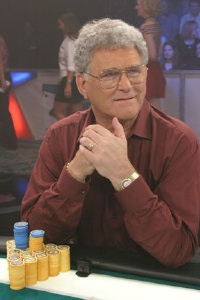|
 "Those
who cannot remember the past are condemned to repeat it." "Those
who cannot remember the past are condemned to repeat it."
-- George Santayana
Santayana's well-known bit of philosophy is widely regarded as true. Thomas Huxley took it one step further, saying that history
itself was the result of people not knowing history!
When it comes to poker, people will debate which skills are the most valuable to a player: psychology,
math, salesmanship, whatever. While it may not be the single most important
thing to have a solid grasp of, having a good sense of history and an ability to learn from history is a vital skill for a player to master.
TJ Cloutier was a tournament poker player with numerous skills. Many people consider his greatest skill to be his ability to remember
pretty much everything about anyone he's ever played against. Whether that's his best skill or not, he is terrific at it. Years ago
at an Omaha tournament at the Bicycle Casino, TJ and I were in a pot together with another player. We all checked on the turn, with me in last
position. Holding AK45, I had bet an AK9 flop, and they called.
When an A came on the turn, I made the nut hand, with no chance of being drawn out on (there was no straight flush possible). I forget what
came on the end, but I got two or three bets out of the other player on the river. TJ folded. One player commented about me getting action
on the river by checking the turn. We were close to the money and TJ was down near the felt and a little cranky, which lead him to do some
educatin' at the table. He merely said: "He [meaning me] likes to do that [check the nuts in last position on the turn]."
I was struck by that comment a few ways and have thought about it a lot since. Firstly, I didn't like him educating my opponents. Second, I didn't
like the fact that I had ever done anything predictable enough to be memorable like that. Then third, I marveled at the fact TJ picked up on
this little tendency of mine. One amazing thing was, even though in the prior five years or so we had played many times before, I am
pretty certain this was only the third time TJ had seen me make this "check the nuts" action (simple little action that it is).
We played different games for many hours spread over several years, but somehow prior to this he had noticed I did this move, and now seeing
it the third time he used the phrase "he likes" to do that. And it's true! I liked to do that! Heaven knows I almost never get a
hand strong enough to do it with, but when I did it, I liked doing it -- meaning I liked doing it as a profitable move. (I also like having the nuts!)
It's remarkable that anyone would be able to consciously draw a conclusion about a play I did maybe nine or ten times in five years!
Other players may also have noticed that I did this play, but 99% of my opponents surely didn't. The type of player I am, if I check
in position on the turn with a coordinated board, my opponents almost always bet into me on the river. So the fact that I may have
missed a few bets from players like TJ was surely more than made up for by the misplays I got from other players.
We all notice things about our opponents. Many of these things lead directly to our making or saving money. If, like TJ, you notice a
bazillion little things like this, and are able to remember all that stuff, the cumulative amount of money earned from knowing
player's histories is going to be quite a lot.
Since I first started playing flop games in Northern California,
I've kept a personal "database" on any player I've played with enough to recognize. I even thought of selling this database when
I moved to Southern California! Unfortunately it was too much of a pain in the butt to do that because it's all in my head.
A good memory is invaluable in poker, but I'm talking about more than mere memory. I'm talking about history. Poker is a complex
mass of pot situations and player tendencies. It's not just "what" somebody did that you need to remember, but the "why"
and the "how" and with "who". Just like in history, where all events are in a context (Napoleon didn't just wake up one
day and decide to invade Russia), useful poker information about your opponents needs to be observed and remembered in the proper context.
If the job were to remember one person, it would be easy. But the job involves at least several people (a home game), or a couple hundred
people (middle limit players in Connecticut or San Jose, for example), or literally thousands of players (major No Limit events).
The more history you have to learn, the tougher the job. But the more history you do learn, the more money in your pocket.
See also Poker Defense and
Playing for the Long Run |

